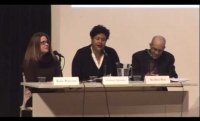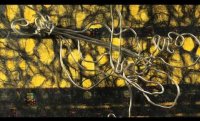New Fifty-Thousand-Dollar Poetry Prize Has Global Ambitions
Just before National Poetry Month kicked off last week, word began to spread about a major new poetry prize out of Canada. The fifty-thousand-dollar Montreal International Poetry Prize, funded by an anonymous donor, isn't honoring a poet's lifetime achievement or a major new book, but a single poem.
The prize purse is highly unusual for a single-poem competition—similar contests tend to offer a few thousand dollars, at most. (The winning poem and forty-nine finalists will also be published in a "global anthology" by Véhicule Press in the fall, and an e-book featuring one hundred additional poems is planned, as well.) We asked prize director Len Epp how he might respond to writers skeptical of the magnitude of this new contest, which Epp hopes will be able to offer the same amount annually.
"I would tell them that single works of art are often given a much greater value than fifty thousand dollars," Epp wrote in an e-mail, "and that we're trying to tell the world that a poet who can produce an excellent poem deserves an excellent reward as much as any other artist. To doubt this is to undervalue poetry in a very unfortunate way."
He added that the prize organization has "done a lot of work to establish our credentials, and we are proud of our advisory and editorial boards," which include international poets Valerie Bloom, Stephanie Bolster, Frank M. Chipasula, Fred D'Aguiar, Michael Harris, John Kinsella, Sinéad Morrissey, Odia Ofeimun, Eric Ormsby, Don Paterson, and Anand Thakore, and fiction writer Ben Okri. Former U.K. poet laureate Andrew Motion will judge.
The contest, looking to cull entries from international poets writing in "the various Englishes of the world," will charge an entry fee based on a sliding scale (writers in designated developing countries may pay a lower rate) ranging from fifteen to twenty-five dollars. When asked why the competition is charging a fee, Epp responded, "While we are actively seeking traditional forms of support through big sponsors and patrons, we are also committed to a self-sustaining community funding model, which would maximize our independence. As with all other poetry competitions that charge fees, entry fees go towards covering our costs, improving the prize, and guaranteeing its future."
In addition to awarding the prize, the organization has long term ambitions to provide direct funding to poets and establish a global poetry center.
More information about the Montreal International Poetry Prize and details on how to enter are available on the prize Web site. The deadline is July 8, and a discounted entry fee is available for poems submitted by April 22.
In the video below, Motion reads two poems at the 2006 Dodge Poetry Festival.






![Poetry - Official Trailer [HD]](https://www.pw.org/files/styles/video_thumb_medium/public/media-oembed/i.ytimg.com/vi/fo2dfY317-k/hqdefault.jpg?itok=s8Xna4zi)

